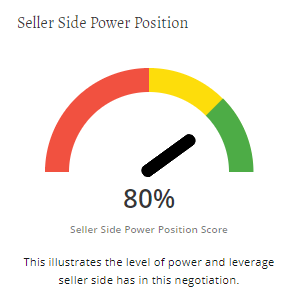The Ten Strongest Sources of Negotiation Power
By Joe Hernandez
 One of the biggest challenges for us as negotiators is when we believe the other side has more power and leverage. This makes us feel disadvantaged. If we feel like we are at a disadvantage, then we are likely to make more concessions to get a deal done.
One of the biggest challenges for us as negotiators is when we believe the other side has more power and leverage. This makes us feel disadvantaged. If we feel like we are at a disadvantage, then we are likely to make more concessions to get a deal done.
Great negotiators know how to shift power from the other party back to them. Performing a power analysis before each negotiation is critical to developing an effective strategy.
It’s a huge mistake to not know both side’s power, and getting it right positions you well to negotiate great deals. Below are 10 key sources of power that have the most impact on leverage for either party.
1. Having a Strong Alternative
If you have a strong alternative going into a negotiation, then you have significant power and leverage in your negotiation. In negotiation terms, our best alternative is called the BATNA (Best Alternative to a Negotiated Agreement.)
In fact, there is probably no bigger source of power and leverage than having a great alternative. opportunity to go after, if the current deal falls apart.
For example, if you need IT services and you have several qualified vendors to choose from, this gives you tremendous power over the other party. They will likely make concessions more readily to get your business.
If you are a sales professional, having a robust pipeline of opportunities ensures you have ample alternatives. Having these alternatives improves your leverage position.
2. Know the BATNA of the Other Side
You must determine the other side’s BATNA for the solution you are offering. Take the time to determine what the other party will do, if the deal with them falls apart. If they don’t have a great alternative, then they have a weak power position. If they have a great alternative, then they have a strong power position.
Knowing their level of power can completely change the way you approach the negotiation.
3. Have Something the Other Side Needs
Always remember that if you are in a negotiation, it’s because the other side sees value in what you are offering. In other words, you have something they need or want.
Understanding what the other side wants can give you significant power.
So often we go into a negotiation assuming we have little or no power or leverage. Don’t jump to that conclusion so quickly, and spend some time identifying why they would spend the time to negotiate with you. What value do you bring that they need?
4. Uniqueness
If what you provide is unique and different from everyone else in the industry, then this gives you tremendous leverage allowing you to call the shots on the terms of the agreement.
But whatever your uniqueness is, it must be in demand. If your company is the only one that provides a certain product or service that is in demand, you can push harder for what you want.
5. Position/Role/Title
If you hold a higher position, level, rank, or seniority over the other party, this can grant you a level of authority over them.
However, for position power to be effective, you must have earned respect and legitimacy from the other party. A fancy title doesn’t mean much if the other side doesn’t believe you carry influence.
6. Expertise
There is extreme value in being an expert in something. You or your company are sought out for the knowledge that you have, and that knowledge is power.
This knowledge could be the experience you have, ways you have figured out how to navigate difficult situations, or your opinions on strategy and execution.
Perhaps you are highly regarded and considered indispensable and critical to success. This power allows you to mandate certain deal elements without much push back from the other party.
7. Coercive
This is the power that is derived through threats, punishments, sanctions, and other negative consequences. For example, one party threatens to put the other party out of business or ruin their reputation if they don’t agree to certain deal points.
This is an area that requires additional caution. If you use coercive power, it may jeopardize your ability to do business with the other party in the future.
Remember good negotiations are stepping stones to future business and growth.
8. Psychological
If you present yourself as confident, assured, calm, knowledgeable, and prepared…whether you are or not, the other side will read your approach and assume you have some edge in the negotiation.

Amy Cuddy, a social psychologist, and professor at Harvard Business School states that non-verbal displays can have a significant impact on the level of power the other side will grant you.
Check out her TED Talk here.
She has proven that if you change your body language, you can change the way you behave. And, the way you behave in a negotiation can determine your level of power.
Some of the body language techniques she recommends for increasing your power and power behavior include spending some time in “power poses” prior to your meeting…some of these are not appropriate at the negotiating table, but some clearly are and you will need to decide which ones make sense.
These power poses include standing with your feet apart and hands on your hips (Superman or Wonder Woman pose), standing at the end of a table and leaning on your hands, sitting with your feet up on your desk with hands behind your head, and spreading yourself out making yourself seem bigger and taking up more space.
Remember, not all of these are appropriate for the negotiation table. However, if you pose as if you have power prior to your negotiation, it will increase your feeling of power, and this will translate to the other party at the table.
9. Referent
This kind of power comes from having other people that can provide a powerful reference to you or your company’s abilities, ROI, trustworthiness, commitment, etc. This power is derived by making personal connections with key and influential people, and having those people speak on your behalf or support you in some way as you attempt to get your deal accomplished.
Referent power allows you to persuade people to agree to deal elements they normally wouldn’t because others are providing a testimonial about your ability to deliver.
10. Reward
Reward power is the ability to provide some incentive, compensation, or other forms of remuneration to the other party.
For example, a manager can impact the salary or bonus for their employees. Therefore, reward power can drive the other party to agree to deal elements more readily and willingly. Other examples involve one party being able to open new markets, sell more products, buy more goods and services, or provide some ROI that is material.
